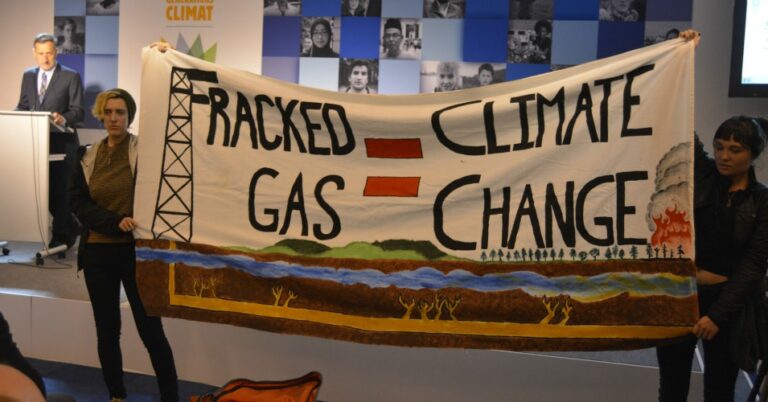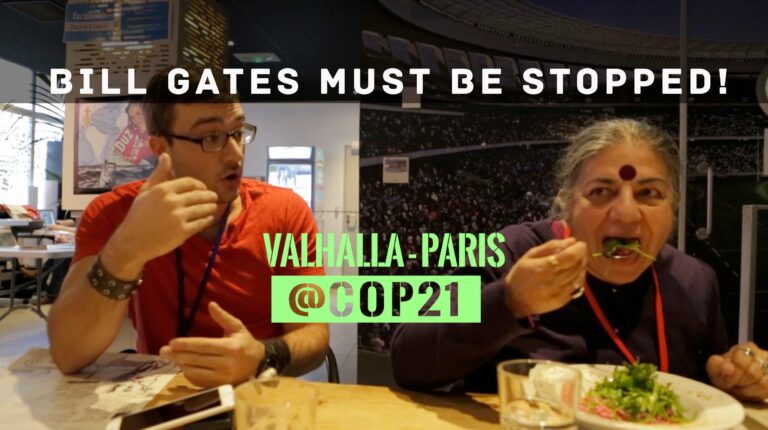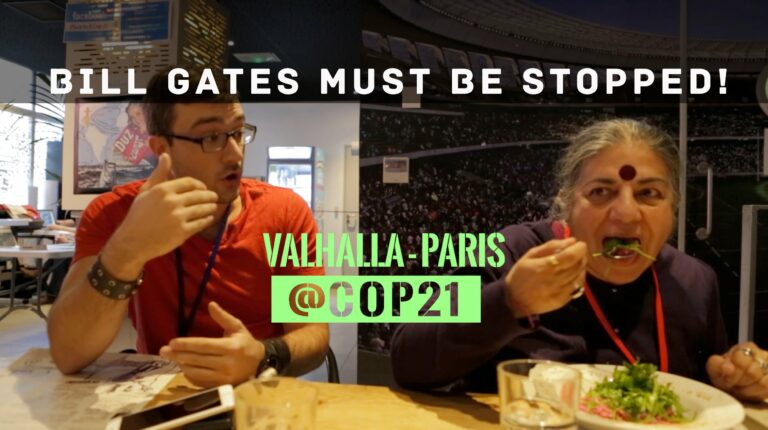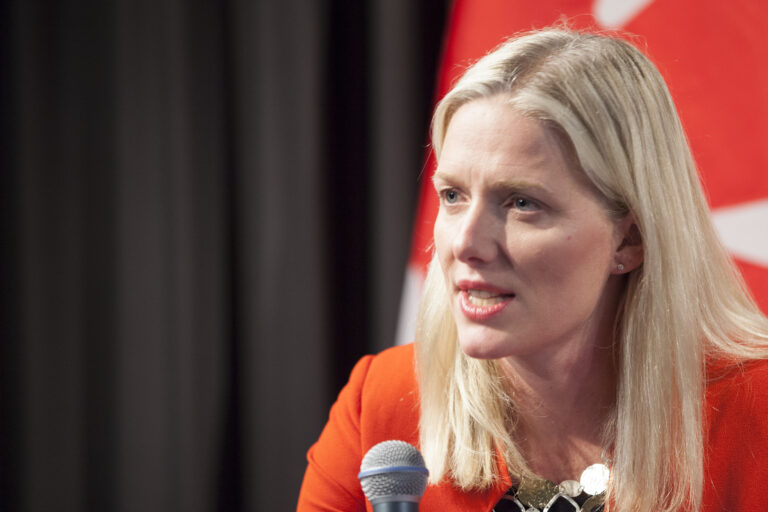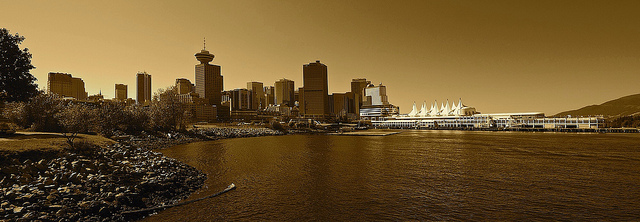Vermont Governor Interrupted By Fractivists In Paris
PARIS, France – In one of the first edgier, unsanctioned confrontations at the official “Le Bourget” climate summit, a flank of young anti-fracking activists on Wednesday interrupted a panel of US politicians, including Vermont Governor Peter Shumlin, calling out their hypocrisy as climate leaders.
Soon after Gov. Shumlin took the podium, two young women rushed the stage, and unfurled a banner that read “Fracked Gas = Climate Change.” Activists continued to stand up and speak out for the duration of the panel, with one declaring to the room: “These aren’t climate leaders, these are climate cheaters.”
Protestors were keen to get across that while Shumlin is being lauded as a climate leader in Paris, back in his home state he’s marshalling forward a major fracked gas pipeline that would snake its way through small Vermont farms and accelerate fracking across the U.S. east coast.
Nathan Joseph, 27, a former Vermonter who now works on a farm in rural Pennsylvania-a state heavily impacted by fracking-stood up in the middle of the Shumlin’s speech.
“I live on the frontlines of fracking in the Marcellus Shale and you are putting through a fracked gas pipeline that jeopardizes people’s livelihoods,” declared Joseph. He also mentioned the concerns of farmers in Vermont whose land was being seized by eminent domain for the pipeline.
Next up, Aly Johnson-Kurts, 21, a native Vermonter, stood up and addressed the governor.
Aly acknowledged that Shumlin banned fracking a few years ago-but highlighted how championing new fracked gas infrastructure simply pushes fracking onto other communities outside Vermont’s borders.
“Vermont banned fracking in 2012, and in the announcement speech you cited risks to safe drinking water and health. In supporting the Vermont gas pipeline, you are simply putting those risks on other communities,” Aly said, facing the governor. “If you want to convince everyday Vermonters that your legacy as governor is one of true environmental stewardship, you must reverse your position on the pipeline.”
Shumlin called Aly “beautiful and eloquent,” but encouraged her to settle down.
A couple vocal audience members countered the protesters by saying: “Shut up”; “That’s enough”; and “Nobody wants to hear you.” Curiously, very similar comments were heard when now Middlebury alum Abigail Borah interrupted U.S. climate envoy Todd Stern’s comments at the Durban climate talks in 2011. By the time Borah finished her remarks, calling on the U.S. and other delegates to “to act now…or threaten the lives of the youth and the world’s most vulnerable,” she received plenary-wide applause.
Shumlin retorted with a line often used by climate deniers and obfuscators: “How did you get here, on an airplane? Or did you swim over?” he asked the protesters. “Because you used fracked gas in that plane, so you better find a way to swim home.”
Earlier, Shumlin told the packed audience “we can’t move fast enough to get off oil and coal” as a way to fight climate change and boost the economy. His seeming exception for natural gas not only flummoxes but also deeply frustrates Vermonters who’ve staunchly opposed the this pipeline in their state for the past three years.
To the Vermont Governor’s credit, he eventually offered the microphone to Aly-but the moderator with Georgetown Climate Center would not allow it.
Soon afterwards, Shumlin left the panel, exiting the event a half an hour before it was set to close.
Bill McKibben, a long-time resident of Vermont, who’s partaking in a number of anti-fracking workshops and events in Paris, offered his support.
“It’s good to see the boisterous spirit of VT translated across the Atlantic,” McKibben told me. “I think the fracked gas pipeline was planned in a different age back before we knew much of what we know about the effects of fracking and methane on the atmosphere. So, it’s a good time for a re-evaluation.”
When Maeve McBride, lead organizer with 350 Vermont, heard about how Vermonters were tailing Shumlin in Paris, she was “proud and heartened.”
“Governor Shumlin has talked a good talk on climate, yet he and his staff actively advocate for expanding fracked gas infrastructure in Vermont,” Maeve wrote in an email. “While Vermont banned fracking, Shumlin’s administration has been promoting the import of fracked gas and cutting deals with Vermont Gas. Vermonters would end up footing the more than $154 million bill for this new pipeline, and Vermont Gas is seizing Vermonters’ land through eminent domain. Governor Shumlin is no climate hero.”
After Shumlin left the session, other speakers took to the podium, including California’s EPA chief, and a senior advisor to Gov. Jay Inslee of Washington state.
These speakers were likewise met with rounds of pointed, mostly unsolicited, questions regarding the approval of fracking in California and why Gov. Inslee wasn’t halting a proposal for the “largest crude rail terminal in the nation” proposed for his state.
With two days left until the climate negotiation are supposedly set to wrap, expect young people to keep stirring the pot.
Written by Joe Solomon for Common Dreams.
Canada Shocks COP21 With Big New Climate Commitment
Sunday night, Canada surprised a world of nations and negotiators in closed-door climate talks in Paris by endorsing a much bolder, ambitious target for cutting greenhouse gases than the UN climate change summit is officially aiming for.
Canada’s Environment and Climate Change Minister Catherine McKenna told a stunned crowd that she wants the Paris agreement to restrict planetary warming to just 1.5 Celsius warming -not two degrees. It was the first time she has made such a statement.
In the room was former CBC meteorologist Claire Martin, a Green Party observer at the talks: “I was like ‘freaking out.” I was writing it all done like a nut,” she said.
Reading from her notes, Martin reported the minister’s remarks like so: “‘We want to send a strong political signal.’ The necessity, that she sees, is one in which we transition sustainably.”
“But she was quite clear -‘I support the goals of 1.5’ and echoed the comments of another party about human rights and indigenous peoples. Canada supports legally binding provisions, and we are committed to following through.”
“She wants a five-year review, and it must be ‘ambitious’ and ‘accountable.'”
“Adaptation is ‘incredibly important’ and she has full support for the ambitious nature of this agreement,” Martin added, about the minister’s remarks.
McKenna’s office confirms it
Minister McKenna’s spokesperson confirmed Monday that she supports “including reference in the Paris Agreement to the recognition of the need to striving to limit global warming to 1.5, as other parties have said.”
“Canada wants an agreement that is ambitious and that is signed by the greatest number of countries possible.”
And crucially, “the most important thing is that each country should be legally required to submit a target. And to report on progress on that target on a regular basis.
This is not the same as legally binding countries to reach their target, as many reports have noted. Countries’ targets will still be outside the agreement. But McKenna’s office added:
“There should also be a legally binding requirement in the agreement that countries improve their targets regularly.”
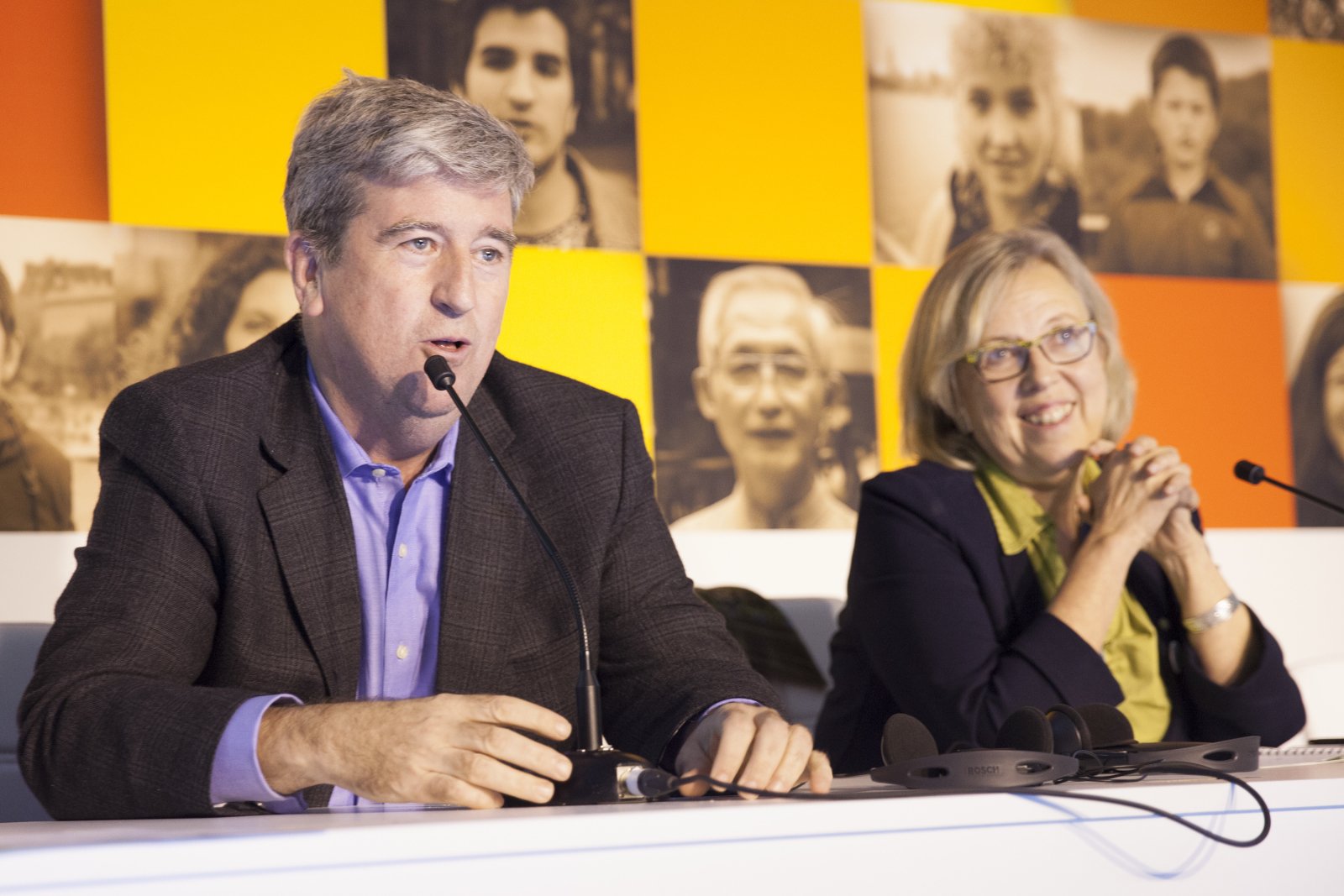
‘I am over the moon’
Green leader Elizabeth May said: “I am over the moon. It’s fantastic news!”
“It creates a very ambitious trajectory for reduction of emissions, but it’s what’s required. If we’re going to keep low-lying island states from going under water, that’s what’s required.”
“If we want to have a reasonable prospect of not having the Greenland ice sheet create five to eight metre sea level rise, it’s what’s required.”
“It’s a safer zone than two [degrees], which represents a lot of irreparable, irreversible damage to large parts of the world. So 1.5 is good.”
The moves just one week after Prime Minister Trudeau promised the world in his speech to the UN climate gathering that climate change would be a “top priority” for Ottawa.
But this latest statement about aiming for 1.5 Celsius has environmentalists -who haven’t been in the habit of congratulating their federal government after nine years of Harper rule -rushing to issue happy-with-Canada press releases.
“This is an incredibly promising signal that Canada really is ready to lead when it comes to ambition and securing a strong global climate deal. Now Canada has a chance to leverage this leadership across key pieces of this agreement and this is what we hope to see over the coming days,” said Steven Guilbeault of Montreal’s Équiterre in Paris.
Likewise, Karen Mahon, of ForestEthics, said: “Action and a strong deal in Paris will help Canada as it returns home and works closely with provinces to develop a plan that puts Paris promises into action”
“Canada is redefining itself in Paris, but it will need to take its leadership home to prove that they really are back.”
Dale Marshal, of Environmental Defence, added Canada would confirm its climate leadership if it put in a “credible financing package” for a developing-country “Loss and Damage fund,” and continued work to get an ambition mechanism that allows reviews of targets and financing before 2020.
Trudeau: ‘no time to waste’
It remains to be seen if the world’s nations agree to Canada’s urging to cap dangerous global warming at 1.5 C.
But praises for Canada come on top of heaps of laudings from Canadian First Nations leaders for backing the inclusion of Indigenous rights in the climate treaty process too. It’s a move opposed by the European Union and United States over fears it could leave them liable for climate damages.
Prime Minister Trudeau said last week in Paris: “Indigenous people have known for thousands of years about how to care of our planet. The rest of us have a lot to learn, and no time to waste.”
Vancouver commits to run on 100% renewable energy
Vancouver has become the latest city to commit to running on 100% renewable energy. The city of 600,000 on Canada’s west coast aims to use only green energy sources for electricity, and also for heating and cooling and transportation.
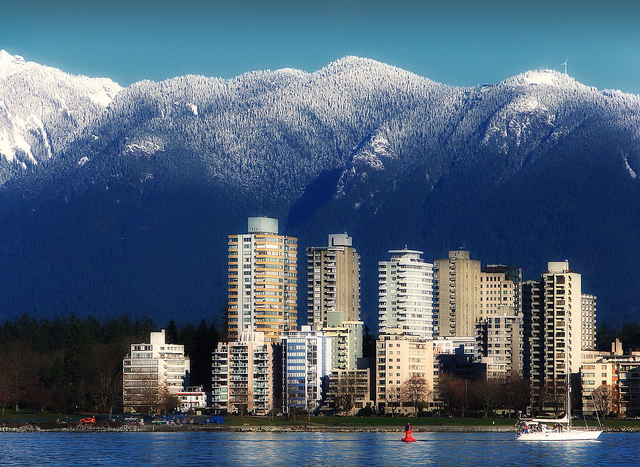
Cities and urban areas are responsible for 70-75% of global CO2 emissions and that’s where “real action on climate will happen” said Park Won-Soon, Mayor of Seoul, South Korea at the ICLEI World Congress 2015, the triennial sustainability summit of local governments where Vancouver made the announcement.
“We are the green tide coming together to save the world from climate change,” Park said to nearly 15,000 members of local government including more than 100 mayors.
Andrea Reimer, Vancouver’s deputy mayor told the Guardian: “There’s a compelling moral imperative but also a fantastic economic case to be a green city.” The 100% goal is likely to be set for a target year of 2030 or 2035 for heating/cooling, with transport taking until 2040 to 2050. These could happen sooner with national and provincial government support.
People and businesses want to live and work in clean and green urban areas, said Reimer, adding that whoever develops expertise in shifting to 100% renewable energy will own the 21st century.
Vancouver can achieve 100% renewable electricity in a few years but heating, cooling and transportation will take longer. The city’s ambition is to be the world’s greenest city by 2020 despite the fact Canada has had one of “the most environmentally irresponsible national governments” for the last 10 years, she said.
Park announced that Seoul, with 11 million people and growing fast, will reduce its energy use and increase renewable generation, including rolling out 40,000 solar panels to households by 2018 and 15,000 electric vehicles. By 2030 it is hoped that CO2 emissions will be cut by 40%.
More than 50 cities have announced they are on their way to 100% renewable energy including San Diego and San Francisco in California, Sydney Australia, and Copenhagen. Some are aiming for 2020, others by 2030 or 2035.
Some, like Reykjavik, Iceland, are already there for electricity and heat. The entire country of Costa Rica was powered by renewables for 75 consecutive days this year.
“Just three years ago we’re saying 100% renewable really is possible, now many cities and regions are doing it,” Anna Leidreiter, coordinator of the Global 100% RE Alliance – an international alliance of organisations pushing for a shift away from fossil fuels.
If large utilities or energy companies are in control it will slow down attempts to tackle climate change, Leidreiter said. “The business model for renewables is completely different, it should benefit people not corporations.”
Green Mini-Makeovers That Will Transform Your Space
With global warming looming at the forefront of today’s planetary issues, there has never been a better time to take steps that will decrease your household’s carbon footprint on the earth. Luckily, a variety of things can be done at home that will get the job done without sacrificing your family’s convenience, safety, or current …
From Dishonored Grandmother to Solar Engineer
We’re all looking for stories of hope – that the world can be changed, that we are not limited by our culture, our backgrounds, our histories. Lucy Naipanoi, a grandmother of the Maasai in Kenya, one of the last hunter gatherer tribes left on the planet, represents the potential for evolution and advancement that has …




